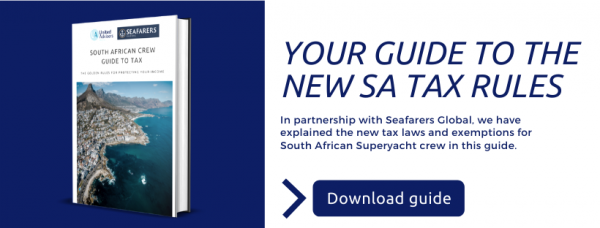31st Aug 2020
Top 10 tips for Superyacht crew
Typically Superyacht crew are in a great position to save and invest. Working onboard means having few expenses and things like end-of-season bonuses and favourable tax positions can add up, literally. However, the world of finance and investments can be confusing and it’s often difficult to know exactly where to start. That’s why we’ve collated our top 10 financial advice tips for Superyacht crew in this post.
1. Open a bank account suited to your needs
Opening the right bank account is the most critical step when organising your finances. Until recently, a Standard Seafarer bank account was considered the only viable option for crew. However, other options exist in the form of ‘free’ online bank accounts.
The most important thing to remember is to have a bank account where your salary is credited in the same currency. This means you have control over when you exchange and transfer your money, rather than being at the mercy of the market on the day your salary lands in your account.
2. don’t fall foul of tax authorities
This is especially important for Superyacht crew as the country in which you must pay tax on your earnings may not necessarily be the same country in which you’re a resident. We understand it can get confusing, so always seek professional advice.
Spend time understanding what tax advantages exist for Superyacht crew. For example, the Seafarers Earnings Deduction (SED) is an allowance that helps UK taxpayers working in the Superyacht industry significantly reduce their tax bill. This is especially important if you decide to manage your own tax returns.
For UK nationals, you are entitled to certain allowances and pensions. Understanding what they are can help you save money, which is why we wrote the UK Crew Guide to Savings, Pensions and Tax.
As we explain in the guide, correctly declaring your income and choosing the right pension plan will put you in the best position to achieve your financial goals. To help you better navigate your obligations and various savings options, the guide is split into four sections:
- Tax – what your obligations are and what allowances are available to UK Superyacht crew.
- Emergency funds – what they are and how to secure yours.
- Pension planning – key considerations for crew and available options.
- Savings – how to use Individual Savings Accounts (ISAs) and other savings vehicles to your advantage.
For South African crew, tax issues can be a little more complicated. Some South African yacht crew incorrectly believe that because they have not registered for tax at the South African Revenue Services (SARS), they are not liable to pay any taxes in South Africa.
That is not the case and we strongly encourage all South African crew to read about changes in March 2020 which effectively introduced an ‘expat tax’.
Given these changes, we wrote a guide exclusively for yacht crew from South Africa who wish to better understand their tax situation. The guide covers:
- what the new legislation includes
- the risks of not declaring your income to SARS
- tax exemptions and how you may qualify
- golden rules for tax
3. Start saving now!!
There is never a perfect time to start saving but once you have opened the right bank account and you’re aware of your tax obligations, it’s a good opportunity to start saving. It is always better to start sooner rather than later and some is always better than none!
Before exploring potential savings and investments, it’s wise to think carefully about what you want to do in the future. What matters most to you and your lifestyle, now and in the future? Once you’ve established what matters, you can start building a financial plan to achieve your goals.
Savings and investments are the third pillar of our three-pillar approach to help professional yacht crew plan and navigate their financial journeys
4. Save in a way that makes sense to you
Yachting presents an incredible opportunity to build personal wealth, but you need to save in a way that makes sense to you, not your fellow crew.
One of the first things we recommend you do is build your emergency fund. It is one of the most important things you should do as part of your savings plan. Not only does an emergency fund act as a financial safety net should you face the unexpected, it will help you build savings easily without even noticing.
It’s important to analyse your current spending and to determine what’s actually stopping you from saving before you launch into choosing the best savings options for you.
That’s why we have written the Yachties Guide to Saving – our free guide that will help you to become a super saver and start planning for your financial freedom.
5. Choose the right investment platform structure for your needs
Investment platforms act as online places to buy, sell and hold your investments. They give you access to things like exchange-traded funds (ETFs), bonds and stocks. But keep in mind that not all investment platforms are the same: different platforms offer different services, which means they charge fees in varying ways.
It’s impossible to avoid paying fees when investing, so it’s essential you weigh the costs of investing with your savings and investment goals. It’s important to choose a platform that suits how and where you will invest. And think carefully about whether you need help when deciding which platform is the best one for you.
As experienced financial advisers, we have access to multiple investment platforms and savings vehicles such as investment bonds. Before recommending the most appropriate investment options for you, we take into account your financial goals and your savings plan. Depending on whether your savings plans are short term (0–5 years) or long term (5–10+ years), we will recommend a mix of investment platforms and savings vehicles.
6. Seek advice from multiple financial advisers
As with any relationship, trust is important when it comes to finding someone to help you manage your personal finances. You need to feel comfortable sharing your financial goals with someone who can then translate those goals into achievable action steps.
Also, because you want your financial adviser to have your best interests at heart, you need to trust them enough to establish a long-term relationship. You need the right ‘fit’.
To work out who you can trust, it’s best to meet with several financial advisers before making your decision. Make sure you ask questions of them and they ask you important questions as well. After all, a great financial adviser’s questions should aim to understand what makes you tick, your aspirations and your concerns.
And finally, make sure they have experience in the Superyacht industry. Financial advisers to the industry understand the unique challenges faced by crew and adapt their way of working to the fast pace of the Superyacht industry.
7. Always stick to your personal financial plan
We all know how easy it is to lose sight of our goals if something unexpected happens, like sudden job loss, illness or, worse yet, a global pandemic. However, an effective financial plan should define all of the actions you need to take should something happen. It’s important to refer to those actions and stick to your personal financial plan.
If you already work with a financial adviser, get in touch with them as soon as something significant changes in your life. They can help you to adjust your financial plan accordingly and keep you on track to achieving your goals.
8. Regularly review your spending and savings
Make it a habit to regularly review your spending and work out if you can save more. Small amounts add up over time. Of course, don’t completely restrict yourself. After all, you’re entitled to enjoy your hard-earned money. Just keep your eye on your financial goals.
Also, consider whether you can commit to a longer term, regular savings plan. Committing to a regular savings plan essentially means agreeing to tying up your money for an agreed period of anywhere from 5 to 20 years. As with any finance-related decision, there are pros and cons of committing to a regular savings plan.
9. Bank your end-of-season bonus
And end-of-season bonus is the perfect savings opportunity for many Superyacht crew. Investing such a lump sum stops you from ‘frittering away’ that money when you’re back on shore and it allows you to benefit from compound interest if you invest it long-term.
Keep in mind that if you keep your bonus as cash, it will be worth less over time because of inflation, so it’s certainly worth investing it and making it go even further.
10. Failing to plan is planning to fail
Savings never seem all that important when you’re financially comfortable. But having savings and investments in place, and planning ahead of retirement, gives you stability, security and ultimately freedom to choose. To choose how long you wish to stay in your yachting career, whether you wish to start a family and ultimately where you want to live and retire when you leave the industry. As the saying goes, if you fail to plan, you are planning to fail.
Learn more about managing your finances
We have developed a bank of resources to help you learn more about managing your money and planning for your future.
Our content is written specifically for Superyacht crew as we understand the unique challenges you face working in a fast-paced industry that crosses international borders.
If you have any questions about our top tips or about finance in general, please get in touch.






